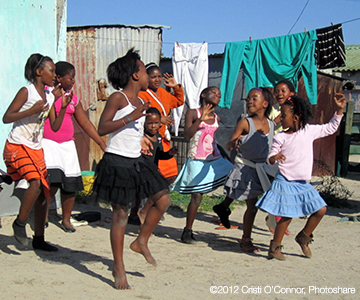December 3, 2020
IAVI Announces Launch of EDCTP-funded Socio-behavioral Project on Accessible HIV Prevention Tools for African Women
Universally accessible HIV Prevention Technologies for African girls and young women through Knowledge applied from behavioral Economics (UPTAKE) presents a unique multidisciplinary collaboration of five leading research institutions in both Africa and Europe.

AMSTERDAM – DECEMBER 03, 2020 – IAVI today announced the initiation of UPTAKE, an innovative behavioral science research project with support from the European and Developing Countries Clinical Trials Partnership (EDCTP). UPTAKE seeks to determine factors that facilitate future uptake of long-acting (LA) technologies to prevent HIV and unintended pregnancy in adolescent girls and young women (AGYW) in Kenya and Uganda. AGYW in sub-Saharan Africa aged 15-24 years are twice as likely to be living with HIV as men in the same age group.
Due to access and adherence issues, existing prevention products, such as condoms, voluntary medical male circumcision, Pre-exposure prophylaxis (PrEP), and treatment as prevention (TasP), continue to fall short in curbing HIV infections among AGYW. LA antiretroviral-based technologies represent a promising avenue for HIV prevention, with recent results from the HIV Prevention Trials Network (HPTN) HPTN 083 study demonstrating LA injectable cabotegravir used as PrEP to be highly effective in preventing HIV acquisition in women in sub-Saharan Africa. Future LA antibody-based technologies are also being explored. This study will determine and test behavioral factors that facilitate adoption and use of future LA HIV pre-exposure prophylaxis (LA-PrEP) alone or in combination with marketed LA contraceptives in Kenya and Uganda.
Funded by a three-year €2.24 million grant from EDCTP and led by IAVI’s offices in Amsterdam and Nairobi, UPTAKE features a unique international consortium of five leading academic, public health, and product development organizations in Africa and Europe.
“We are very excited to launch the new multi-staged UPTAKE consortium and collaborate with this multidisciplinary group of leading experts in socio-behavioral science, health economics, and HIV prevention research,” said Professor Anatoli Kamali, Regional Director, East Africa Programs, IAVI, and the Primary Investigator and scientific coordinator of this project. “We are very grateful for the financial support provided by the EDCTP that will enable us to implement this study and to disseminate its findings in the region facilitated by our collaboration with the East African Health Research Commission (EAHRC).”
 This study will inform the product development of novel LA HIV prevention products, including formulation, device, delivery, and packaging decisions, and enabling the licensure of better suited multi-purpose technologies to prevent both HIV and unwanted pregnancy among young female populations in sub-Saharan Africa. Furthermore, UPTAKE will contribute to strengthened capacity for implementing socio-behavioral interventions and formative research in sub-Saharan Africa.
This study will inform the product development of novel LA HIV prevention products, including formulation, device, delivery, and packaging decisions, and enabling the licensure of better suited multi-purpose technologies to prevent both HIV and unwanted pregnancy among young female populations in sub-Saharan Africa. Furthermore, UPTAKE will contribute to strengthened capacity for implementing socio-behavioral interventions and formative research in sub-Saharan Africa.
“It is imperative that we consider the needs, preferences, and behaviors of end-users, policy makers, and health care providers in early stages of development of health technologies for HIV prevention if we are to optimize the impact in low- and middle-income countries,” said Professor Walter Jaoko, Director of KAVI-Institute of Clinical Research at the University of Nairobi, Kenya. To facilitate this, UPTAKE will utilize behavioral research approaches with at-risk adolescent girls and young women, female sex workers, health care providers, and policy makers. For the latter target group, UPTAKE will provide more robust evidence to support policy-influencing strategies for adoption and institutionalization of research results within public health systems.
“This study is monumental in helping researchers and program implementers understand the attributes that work best for designing interventions to enhance adherence to long-acting marketed contraceptive products for AGYW,” said Yvonne Wangũi Machira, director, socio-behavioral research (SBR), IAVI. “It is expected that the outputs from this study will serve as models for adherence to LA-PrEP, a significant milestone for HIV prevention.”
Using a health economics model developed through collaboration between Busara Center for Behavioural Economics and the London School of Hygiene and Tropical Medicine (LSTHM), researchers will also assess the cost-effectiveness of interventions to impact LA prevention products for HIV and unintended pregnancies in Kenya and Uganda. This novel model has potential to impact health policy, health-care services, and consumer behaviors through future recommendation on effective and accessible biomedical interventions.
For more information about IAVI’s End-user Research Program, click here.
To learn more about UPTAKE, visit the study website here.
Consortium partners:
Busara Center for Behavioural Economics
KAVI-Institute of Clinical Research (KAVI-ICR)
London School of Hygiene and Tropical Medicine (LSHTM)
Medical Research Council/Uganda Virus Research Institute & LSHTM Uganda Research Unit on AIDS (MRC/UVRI & LSHTM Uganda Research Unit)